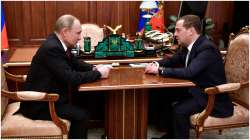Russian PM Medvedev resigns moments after Vladimir Putin's State of the Nation address
The Tass news agency reports that Russian Prime Minister Dmitry Medvedev submitted his resignation to President Vladimir Putin on Wednesday. Russian news agencies said Putin thanked Medvedev for his service but noted that the prime minister’s Cabinet failed to fulfil all the objectives set for it.

Russian President Vladimir Putin proposed a constitutional overhaul Wednesday to boost the powers of parliament and the Cabinet, a move signalling Putin's intention to carve out a new position for himself after his current term ends.
Prime Minister Dmitry Medvedev submitted his resignation hours after Putin discussed the constitutional amendments during his state of the nation address.
The Russian leader thanked Medvedev for his service but said the prime minister's Cabinet had failed to fulfill all of its objectives. In televised remarks, Putin said Medvedev would take up a new position as a deputy head of the presidential Security Council.
Medvedev, a longtime close associate of Putin's, has served as Russia's prime minister since 2012. He spent four years before that as president in 2008-2012, becoming a placeholder when Putin had to switch into the prime minister's office because of constitutional term limits on the presidency.
Medvedev obediently stepped down after just one term as president and let Putin reclaim the top job in what was widely seen as cynical political maneuvering and triggered massive protests in Moscow
Putin asked the member's of Medvedev's Cabinet to keep working until a new Cabinet is formed.
Medvedev's resignation followed Putin's annual state of the nation address earlier Wednesday. During his speech, the Russian leader proposed amending the constitution to increase the powers of prime ministers and Cabinet members.
The proposed move is seen as part of Putin's efforts to carve out a new position of power for himself to stay at the helm after his current term as president ends in 2024.
Read | Who is Dmitry Medvedev, the Russian PM who resigned